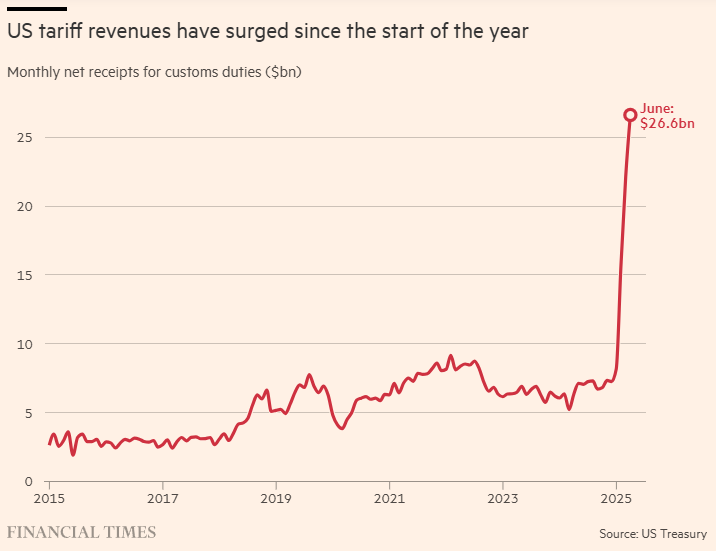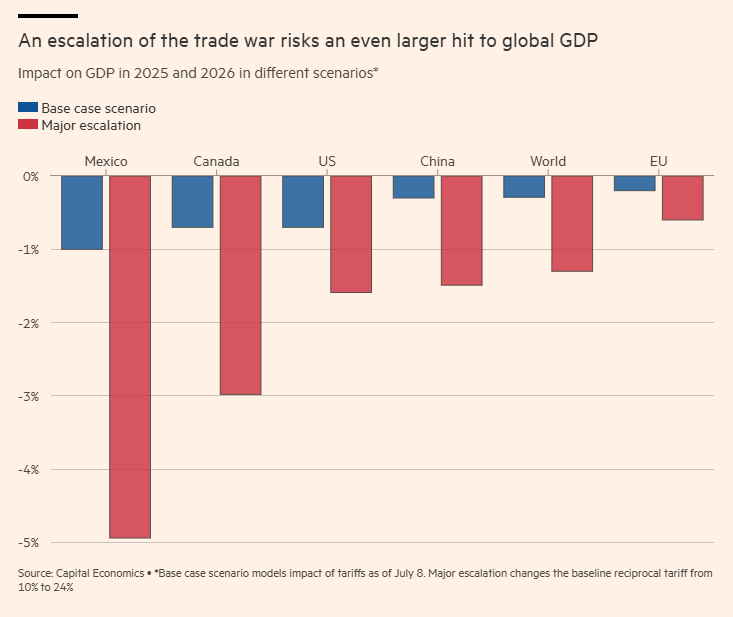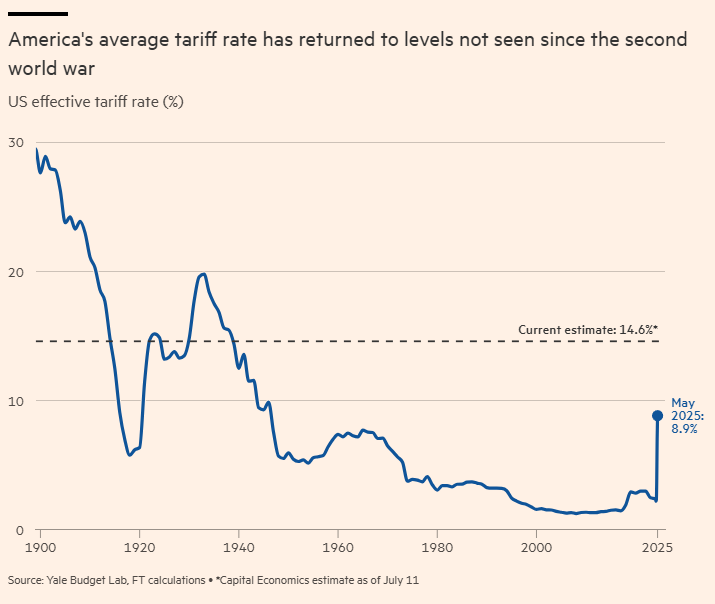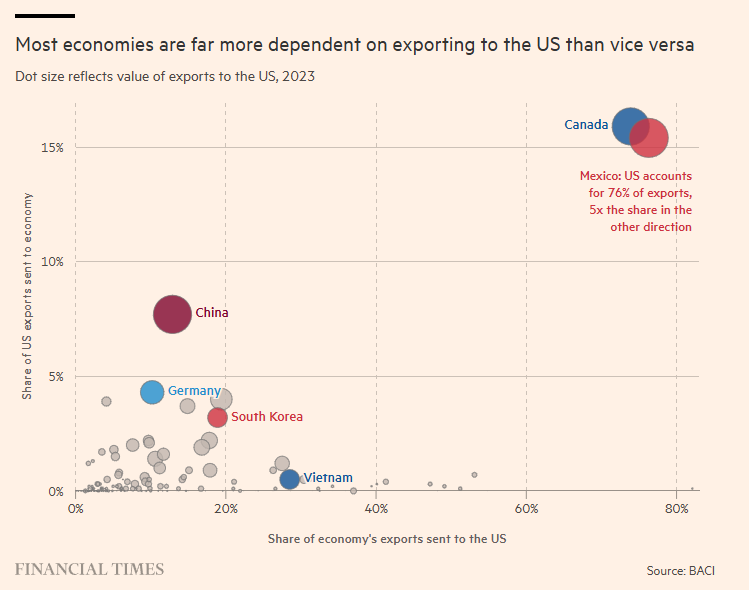- 0
- taikun
- 조회 수 15
https://www.ft.com/content/82e32f7c-47e2-4e96-bb53-a58377e18aa9
Donald Trump reaps $50bn tariff haul as world ‘chickens out’
도널드 트럼프, 세계가 '겁먹은' 가운데 500억 달러 관세 추징
Only China and Canada have retaliated against US president’s tariff war
미국 대통령의 관세 전쟁에 보복 조치를 취한 나라는 중국과 캐나다뿐이다
America’s trading partners have largely failed to retaliate against Donald Trump’s sweeping tariffs, allowing a president taunted for “always chickening out” to raise nearly $50bn in extra customs revenues at little cost.
Four months since Trump fired the opening salvo of his trade war, only China and Canada have dared to hit back at Washington imposing a minimum 10 per cent global tariff, 50 per cent levies on steel and aluminium, and 25 per cent on autos.
At the same time US revenues from customs duties hit a record high of $64bn in the second quarter — $47bn more than over the same period last year, according to data published by the US Treasury on Friday.
China’s retaliatory tariffs on American imports, the most sustained and significant of any country, have not had the same effect, with overall income from custom duties only 1.9 per cent higher in May 2025 than the year before.
Combined with limited retaliation from Canada, which has yet to release second-quarter customs data, the duties imposed on American exports worldwide represent a tiny fraction of the US revenue during the same period.
Some other US trading partners decided against responding in kind while negotiating with Trump to avoid even higher threatened tariffs.
The EU, the world’s biggest trading bloc, has planned counter-tariffs but has repeatedly deferred implementation, now linking them to Trump’s August 1 deadline for talks.

미국의 무역 파트너들은 도널드 트럼프의 광범위한 관세에 대한 보복 조치를 거의 취하지 않았으며, 그 결과 "항상 겁이 많다"는 조롱을 받던 대통령은 거의 비용 없이 500억 달러에 가까운 추가 관세 수입을 확보할 수 있었습니다.
트럼프가 무역 전쟁의 포문을 연 지 4개월이 지났지만, 중국과 캐나다만이 최소 10%의 국제 관세, 철강 및 알루미늄에 50%, 자동차에 25%의 관세를 부과하며 워싱턴에 반격했습니다.
미국 재무부가 금요일 발표한 자료에 따르면, 미국의 관세 수입은 2분기에 640억 달러로 사상 최고치를 기록했는데, 이는 전년 동기 대비 470억 달러 증가한 수치입니다.
미국 수입품에 대한 중국의 보복 관세는 전 세계 국가 중 가장 지속적이고 중요한 조치였지만, 같은 효과를 내지 못했습니다. 2025년 5월 관세 수입은 전년 대비 1.9% 증가에 그쳤습니다.
아직 2분기 관세 데이터를 공개하지 않은 캐나다의 제한적인 보복 조치를 고려하면, 전 세계 미국 수출품에 부과된 관세는 같은 기간 미국 수입의 극히 일부에 불과합니다.
다른 일부 미국 무역 파트너들은 트럼프 대통령과 협상하는 동안 더 높은 관세 위협을 피하기 위해 동일한 방식으로 대응하지 않기로 결정했습니다.
세계 최대 무역 블록인 EU는 상계관세를 계획했지만 이행을 거듭 연기해 왔으며, 이제는 트럼프 대통령이 정한 8월 1일 협상 마감일과 연계하고 있습니다.
The cost of Trump’s tariffs are also not falling solely on American consumers, supply chain experts say, as international brands look to spread the impact of cost increases around the globe to minimise the impact on the US market.
Simon Geale, executive vice-president at Proxima, a supply chain consultancy owned by Bain & Company, said big brands such as Apple, Adidas and Mercedes would look to mitigate the impact of price increases.
“Global brands can try and swallow some of the tariff cost through smart sourcing and cost savings but the majority will have to be distributed across other markets, because US consumers might swallow a 5 per cent increase, but not 20 or even 40,” Geale said.
But despite US tariffs hitting levels not seen since the 1930s, the timidity of the global response to Trump has forestalled a retaliatory spiral of the kind that decimated global trade between the first and second world wars.
Economists said the US’s dominant position as the world’s largest consumer market, coupled with Trump’s threats to redouble tariffs on states that defy him, meant that for most countries the decision to “chicken out” was not cowardice, but economic common sense.
Modelling by Capital Economics, a consultancy, found that a high-escalation trade war where the average reciprocal tariff rate reached 24 per cent would cause a 1.3 per cent hit to world GDP over two years, compared with 0.3 per cent in a base case where it remained at 10 per cent.

공급망 전문가들은 트럼프의 관세 부과로 인한 비용이 미국 소비자에게만 전가되는 것이 아니라고 지적합니다. 글로벌 브랜드들은 미국 시장에 미치는 영향을 최소화하기 위해 비용 인상의 영향을 전 세계로 분산시키려 하고 있기 때문입니다.
베인앤컴퍼니가 소유한 공급망 컨설팅 회사인 프록시마의 사이먼 기일 부사장은 애플, 아디다스, 메르세데스와 같은 대형 브랜드들이 가격 인상의 영향을 완화하기 위해 노력할 것이라고 말했습니다.
"글로벌 브랜드들은 현명한 소싱과 비용 절감을 통해 관세 비용의 일부를 감당하려 할 수 있지만, 미국 소비자들은 5% 인상은 감수할 수 있을지 몰라도 20%, 심지어 40% 인상은 감수할 수 없기 때문에 대부분은 다른 시장에 유통되어야 할 것입니다."라고 Geale은 말했습니다.
하지만 미국의 관세가 1930년대 이후 최고 수준에 도달했음에도 불구하고, 트럼프 대통령에 대한 세계 각국의 소극적인 대응은 1차 세계 대전과 2차 세계 대전 사이에 세계 무역을 파괴했던 것과 같은 보복적 악순환을 막았습니다.
경제학자들은 세계 최대 소비 시장이라는 미국의 지배적 지위와 자신에게 반항하는 국가에 대한 관세를 두 배로 인상하겠다는 트럼프 대통령의 위협을 고려할 때, 대부분의 국가들이 "겁먹은" 결정은 비겁함이 아니라 경제적 상식이라고 말했습니다.
컨설팅 회사인 Capital Economics의 모델링에 따르면, 평균 상호 관세율이 24%에 달하는 심각한 무역 전쟁이 발생하면 2년간 세계 GDP가 1.3% 감소하는 반면, 기준 시나리오에서 10%로 유지되는 경우에는 0.3% 감소할 것으로 나타났습니다.
“Unlike the 1930s when countries had more balanced trading relationships, today’s world features a hub-and-spoke system with the US at the centre,” said Marta Bengoa, professor of international economics at City University of New York. “That makes retaliation economically less desirable for most countries, even when it might be politically satisfying.”
Alexander Klein, professor of economic history at the University of Sussex, added that short-term considerations — reducing exposure to tariffs and minimising the risk of inflation — were driving most negotiations with Trump, which gave the White House the upper hand.
뉴욕시립대학교 국제경제학과 마르타 벤고아 교수는 "1930년대처럼 각국이 더욱 균형 잡힌 무역 관계를 유지했던 것과 달리, 오늘날 세계는 미국을 중심으로 하는 허브 앤 스포크 시스템을 갖추고 있습니다."라고 말했습니다. "이로 인해 대부분의 국가는 정치적으로 만족스럽더라도 보복 조치를 경제적으로 선호하지 않습니다."
서식스 대학교의 경제사 교수인 알렉산더 클라인은 관세 노출을 줄이고 인플레이션 위험을 최소화하는 단기적 고려 사항이 트럼프와의 협상 대부분을 주도했으며, 이로 인해 백악관이 우위를 점하게 되었다고 덧붙였습니다.
“I’d like to think leaders were learning the lessons of history, but I fear that’s optimistic. More likely, the EU, Canada and many other governments fear the hit to global supply linkages and inflation from escalation,” he said. “Trump cares less about that, so is taking advantage.”
The US’s largest trading partner, Mexico, did not retaliate after being hit with 25 per cent tariffs in March on exports not covered by the US-Mexico-Canada Agreement. From the beginning of her talks with Trump, President Claudia Sheinbaum said she preferred a deal.
The failure of the world to unite and collectively face down Trump’s threats has also left the US president more space to pick off individual states. He threatened a 50 per cent tariff on Brazil last week, citing largely political justifications.
“Trump has made it clear that he is prepared to raise tariffs further in the face of retaliation,” said Bengoa of City University of New York. “Many countries learned from the 2018-2019 trade war that retaliation often leads to counter-retaliation rather than negotiated solutions.”

"지도자들이 역사의 교훈을 배우고 있다고 생각하고 싶지만, 그건 낙관적인 전망일 뿐이라는 생각이 듭니다. 오히려 EU, 캐나다를 비롯한 여러 국가들이 경기 침체로 인한 글로벌 공급망 연계성과 인플레이션의 타격을 우려하고 있을 가능성이 높습니다."라고 그는 말했습니다. "트럼프는 그런 것에는 별로 관심이 없고, 오히려 이를 이용하고 있습니다."
미국의 최대 무역 상대국인 멕시코는 3월에 미국-멕시코-캐나다 협정에 해당하지 않는 수출품에 25% 관세를 부과받았지만 보복 조치를 취하지 않았습니다. 클라우디아 샤인바움 대통령은 트럼프 대통령과의 회담 초기부터 합의를 선호한다고 밝혔습니다.
세계가 단결하여 트럼프 대통령의 위협에 공동으로 맞서지 못하면서 미국 대통령은 개별 국가를 공격할 여지를 더 많이 갖게 되었습니다. 그는 지난주 주로 정치적 명분을 내세워 브라질에 50% 관세를 부과하겠다고 위협했습니다.
뉴욕시립대학교의 벤고아는 "트럼프 대통령은 보복에 직면하면 관세를 추가로 인상할 준비가 되어 있음을 분명히 했습니다."라고 말했습니다. "많은 국가들이 2018-2019년 무역 전쟁을 통해 보복은 협상된 해결책보다는 오히려 역보복으로 이어지는 경우가 많다는 것을 깨달았습니다."
Even within unified blocs such as the EU, the competing interests of individual member states, combined with wider fears over whether a confrontation with Trump could undermine US security guarantees to Europe, have bred intense caution.
Trump’s decision to threaten to increase tariffs to 30 per cent did not provoke a major reaction in Brussels, in part because senior US officials, including Treasury secretary Scott Bessent, reached out behind the scenes to counsel caution, according to insiders.
An EU official familiar with the talks added that negotiations were not taking place in isolation, at a time when Europe was looking for continued US backing for Ukraine. “They affect the whole spectrum of US relations including those regarding security,” they said.
EU와 같은 통합된 블록 내에서도 개별 회원국의 이해관계 충돌과 트럼프와의 대립이 유럽에 대한 미국의 안보 보장을 약화시킬 수 있다는 우려로 인해 심각한 경계심이 조성되었습니다.
트럼프 대통령이 관세를 30%까지 인상하겠다고 위협했지만, 브뤼셀에서는 큰 반발이 없었다. 내부 관계자들에 따르면, 스콧 베센트 재무장관을 비롯한 미국 고위 관계자들이 막후에서 신중론을 제기했기 때문이라고 한다.
이번 협상에 정통한 한 EU 관계자는 유럽이 우크라이나에 대한 미국의 지속적인 지원을 모색하고 있는 상황에서 협상이 단독으로 진행된 것이 아니라고 덧붙였다. "이번 협상은 안보 관련 문제를 포함한 미국의 관계 전반에 영향을 미칠 것"이라고 그들은 말했다.
As a result, unlike China, which matched Trump tariff for tariff in April, the EU has repeatedly delayed implementing its packages of retaliatory measures as it seeks to leave space to cut a deal with Trump ahead of August 1.
When the European Commission published its latest list of potential retaliatory targets on €72bn of goods on Tuesday — including Boeing aircraft, cars and bourbon — it put no specific tariff rates against individual products, in an apparent attempt not to rile Trump further.
Even Canada and China have been wary of antagonising Trump despite being the only two countries to impose retaliatory tariffs.
US tariffs on China escalated to 145 per cent by mid-April, causing Chinese exports to the US to plummet by a third in May. Both sides quickly stepped back, agreeing a 90-day pause in Geneva in May, cutting the rate down to 30 per cent.
In February and March Canada imposed nearly C$155bn in retaliatory tariffs, including on steel and auto parts. In recent weeks though it has retreated in the face of US pressure despite election promises by Canadian premier Mark Carney to confront Trump.

이로 인해 4월에 트럼프의 관세에 맞불을 놓은 중국과 달리, EU는 8월 1일 이전에 트럼프와 합의에 도달할 수 있는 여지를 남기기 위해 일련의 보복 조치 이행을 반복적으로 지연해 왔습니다.
유럽연합 집행위원회는 화요일 보잉 항공기, 자동차, 버번 위스키를 포함한 720억 유로 상당의 상품에 대한 잠재적 보복 대상 목록을 발표했지만, 개별 상품에 대한 구체적인 관세율은 명시하지 않았습니다. 이는 트럼프의 심기를 불편하게 하지 않으려는 의도로 보입니다.
캐나다와 중국조차도 보복 관세를 부과한 유일한 두 나라임에도 불구하고 트럼프 대통령의 반발을 사고 싶어하지 않았습니다.
미국의 대중국 관세는 4월 중순까지 145%로 인상되었고, 이로 인해 5월 중국의 대미 수출은 3분의 1로 급감했습니다. 양측은 신속하게 입장을 바꿔 5월 제네바에서 90일간 관세를 유예하고 관세율을 30%로 낮추는 데 합의했습니다.
캐나다는 2월과 3월에 철강 및 자동차 부품을 포함하여 약 1,550억 캐나다 달러 규모의 보복 관세를 부과했습니다. 그러나 최근 몇 주 동안 마크 카니 캐나다 총리가 트럼프 대통령에 맞서겠다고 선거 공약을 했음에도 불구하고 미국의 압력에 직면하여 관세를 철회했습니다.
With US trade accounting for 20 per cent of Canadian GDP — compared with 2 per cent for the US — Carney has calibrated his responses. He ditched a digital services tax under US pressure and did not match Trump’s decision last month to double steel tariffs to 50 per cent.
“Carney’s ‘elbows up’ rhetoric worked during the election campaign, but we can’t be confrontational with the US,” said Dan Nowlan, an adviser to former Conservative Canadian premier Stephen Harper. “It’s now a much more realist approach.”
Diplomats say whether the world will eventually unite to confront Trump will depend in part on where tariff levels settle around the August 1 deadline.
Trade commissioner Maroš Šefčovič said this week that a 30 per cent tariff on EU exports would leave the bloc with nothing to lose since transatlantic trade would be “almost impossible”. He added the EU was talking to “like-minded” trading partners about potential joint measures.
Longer term, the failure to retaliate would also give US companies a relatively free pass into global supply chains while EU and Asian manufacturers still faced high tariffs into the US, said Creon Butler, head of global economy at Chatham House.
“The calculation is short term versus long term,” he said. “It makes sense not to retaliate in the short term, but long term, there’s a calculation for other countries over the extent to which we are going to fight for global supply chains outside the US.”
캐나다 GDP에서 미국 무역이 차지하는 비중이 20%(미국은 2%)에 달하는 상황에서, 카니 총재는 대응을 조정했습니다. 그는 미국의 압력에 굴복하여 디지털 서비스세를 폐지했고, 지난달 트럼프 대통령이 철강 관세를 두 배인 50%로 인상하기로 한 결정에는 대응하지 않았습니다.
"카니의 '팔꿈치 들기'식 수사는 선거 운동 기간 동안 효과가 있었지만, 미국과 대립할 수는 없습니다."라고 스티븐 하퍼 전 캐나다 보수당 총리의 자문위원이었던 댄 노울런은 말했습니다. "이제는 훨씬 더 현실적인 접근 방식입니다."
외교관들은 세계가 트럼프에 맞서기 위해 결국 단결할지는 8월 1일 시한을 전후하여 관세 수준이 어떻게 결정되는지에 따라 부분적으로 달라질 것이라고 말합니다.
마로스 셰프초비치 무역담당 집행위원은 이번 주 EU 수출품에 30% 관세를 부과하면 대서양 무역이 "거의 불가능"하기 때문에 EU는 잃을 것이 전혀 없을 것이라고 말했습니다. 그는 EU가 "같은 생각을 가진" 무역 파트너들과 잠재적인 공동 조치에 대해 논의하고 있다고 덧붙였습니다.
채텀 하우스의 글로벌 경제 담당 책임자인 크레온 버틀러는 장기적으로 보복 조치가 취해지지 않을 경우 미국 기업들은 글로벌 공급망에 비교적 자유롭게 진입할 수 있는 반면, EU와 아시아 제조업체들은 여전히 미국에 높은 관세를 부과받을 것이라고 말했습니다.
"단기적 대 장기적 계산이 필요합니다."라고 그는 말했다. "단기적으로는 보복하지 않는 것이 합리적이지만, 장기적으로는 미국을 제외한 글로벌 공급망을 놓고 우리가 어느 정도까지 싸울지에 대한 다른 국가들의 계산이 필요합니다."





